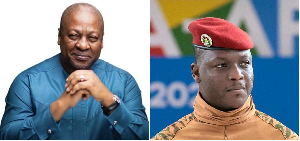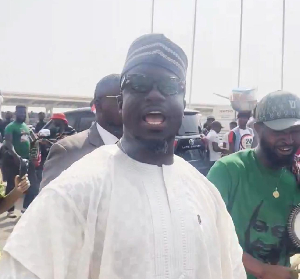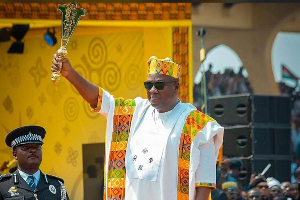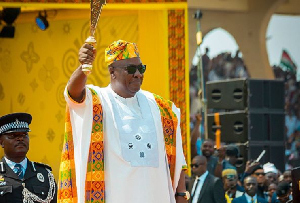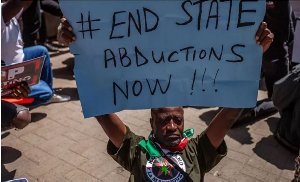ACCRA, Ghana - Nearly 50 years after Ghana led a wave of African nations to independence from colonial rule, this quiet West African country is not the success that Kwame Nkrumah, its charismatic first leader, had hoped.
Rather than being an established industrial power, it still imports most everything, even cans of the tropical fruit so plentiful here. No major highways have been built since the 1960s. Power and water are unreliable, corruption and inequality are growing, and the unemployment rate is low - just 5 percent - only because selling chewing gum at traffic lights counts as a job.
"If Nkrumah was alive, he would get angry and say, `Is this my Ghana?'" said Kofi Tetteh, a 50-something fisherman in Prampram, a dusty, poverty-mired fishing village outside Accra where buying a lottery ticket is seen as the only real chance at improving life. "This is not his vision. He wanted things to go better than this."
But by many measures, Ghana is doing well, or at least much better than its neighbors. After years under military rule, it is a stable democracy that in January 2001 saw its president peacefully hand over power to the opposition party, still a rarity in Africa. Despite unrest or outright war in many of its neighbor nations, Ghana is peaceful and has resisted ethnic splits.
International institutions and developed nations point to it as a model of economic and political reform on the continent, and last year canceled much of its crushing international debt. It has free basic education for all, a free press and is implementing a national health insurance plan.
Perhaps most telling, over the last decade, the National Commission for Civic Education has handed out so many pocket versions of the constitution that many of the 22 million people in this deeply religious nation can quote their rights as easily as they quote the Bible or the Quran. A surprising number of people say they are happy and optimistic.
"I love my country. I wouldn't go anywhere else no matter what you pay me. The freedom I have here, I don't think I would find it elsewhere," said Yakubu Abdulai, 33, who rents out earthmoving equipment on the fringes of Accra, the capital. A Muslim from the north of Ghana, he calls his equipment-driver friends, all southern Christians, "my brothers."
"In Ghana, we love each other. We enjoy the peace a lot," he said.
Ghana is in many ways a model for the continent, an emblem of what is working, what is not and how recovery might be possible.
Nkrumah, an icon of the pan-Africanist movement, envisioned his nation as part of a grand Union of African States that would one day unite the continent in a common currency and common citizenship. He foresaw an industrialized Africa, with mechanized farming in the Congo basin capable of feeding half the world and a continent free of disease and hunger. His Ghana had a nascent nuclear power program and top universities that produced the likes of United Nations Secretary-General Kofi Annan.
A half-century later, Africa looks nothing like Nkrumah's vision. It is mired in war and hunger and corruption, its people dying of AIDS and malaria and simple diseases such as diarrhea. Most farmers still plow and plant by hand. Factories and good jobs are scarce.
But Ghana's experience suggests that with sufficient leadership, planning and self-reliance, Africa could change.
In Africa, "the situation is such that it's hard to be generally optimistic," said Emmanuel Gyimah-Boadi, a political scientist and head of the Center for Democratic Development in Accra. But "islands of stability and prosperity on the continent may be able to inspire others," as South Africa has done in now largely peaceful southern Africa, he said.
Ghana, which will celebrate its 50th anniversary of independence next March, has seen its share of hard times since the idealistic Nkrumah took office in 1957 and was ousted in a military coup in 1966. For the next two decades, the country fell into economic and political decline under a series of lackluster presidents and military rulers and only began to pull itself out again after Flight Lt. Jerry Rawlings - a military dictator later elected president - put the country through some tough economic reforms in the mid-1980s. Since the 1990s, Ghana has scrambled back toward respectability and some success with a new constitution, multiparty democracy and free elections.
Still, per capita income in Ghana today is $380 a year, less than half what it was in real terms at the time of independence. Almost half of its tiny $3 billion national budget comes from foreign aid. Economic growth is running at an impressive 5.8 percent, but inflation, at 11 percent a year, is slowly devaluing the currency, the cedi.
On Accra's steamy streets, shops often are hidden behind sidewalks jammed with petty traders hawking everything from electrical extension cords to used clothing. Good jobs are increasingly hard to find as factories, unable to trim costs to meet global competition, close.
"We're caught up in this international adulation that we're doing well. We're not doing that well," said Nii Moi Thompson, an economic analyst. In Africa "you have a bunch of losers, and if you're slightly less a loser, people are happy about it."
Two major roadblocks lie in the way of solving the country's problems, Thompson and other analysts say: a lack of effective planning and corruption.
Ghana's current plan for economic and social progress is largely a mishmash of foreign aid efforts - a program to house street children, another to build schools - without any clear overriding aims.
The government of President John Kufuor has pledged to transform Ghana from a poor to a middle-class country, with per capita income of $1,000 a year, by 2015. But critics charge there is little in the way of a road map to achieve that goal.
"Kwame Nkrumah knew where he was going. He had a program. Now we have no program and we don't know where we are going. And I say that as a member of the ruling party," said Peter Ala Adjetey, a prominent lawyer and former speaker of parliament for Ghana's New Patriotic Party.
The main impediment, he said, is the same one slowing down progress across much of Africa: corruption.
Ghana's problem is hardly as severe as that in nearby Nigeria, where oil riches have spurred such egregious graft that the country rakes in billions of dollars a month but most of its people live in abject poverty. But even in Ghana, "corruption goes all through the government, from top to bottom," Adjetey said.
Increased foreign aid, rather than being a solution to Ghana's woes, as everyone from Tony Blair to Bono has suggested, is also part of its problem, many Ghanaians insist. A flood of aid, usually directed to specific projects that are not always part of overall national goals, has sapped the country's initiative to solve its own problems and "made us lose some confidence," said K.B. Asante, a retired diplomat who served in ministerial and other government positions under Nkrumah, Rawlings and Kufuor.
"The projects, however good they are, are not helping us make any headway," he said. Ghanaians who once filled their own potholes now wait for foreigners to fix the roads, and politicians wait for their kickbacks on contracts, he said.
A better solution, he and others say, is for Ghana to ease its dependence on Western developed nations and begin trying with its neighbors to find some kind of "African consensus" on how to solve the continent's problems - an effort that could include such things as a return to more state-run industries to create jobs and show private business that Africa is a good investment.
Making that work will require good leaders, and "since Kwame Nkrumah put national development ahead of himself, we haven't had anyone else do that," Thompson said.
But there are some positive signs in Ghana. Expatriates who fled in the bad days are slowly returning, contributing their skills and investment. Ghana's soldiers, who for so long ruled the country, are back in their barracks. A billboard reading "The Armed Forces_Civilian Friendly" now sits at the entrance to the military training school at the edge of Accra, near where Rawlings shot his predecessor, on a sandy rifle range overlooking the Atlantic, after taking power in a 1979 coup.
Democracy - and an appreciation of its benefits - is deepening.
Phillip Acguaye, 28, a truck driver's assistant in Prampram, complains that money is always short and jobs are scarce.
"The government is doing nothing for us, especially the youth. They are not looking our way," he said.
But in Ghana, he said, no one thinks fighting, or a return to military rule, is the answer. Instead, if Ghanaians have a conflict with their government, "we'll use our thumb to settle it," he said, holding out the thumb that is marked in ink when he votes.
Opinions of Monday, 24 July 2006
Columnist: Chicago Tribune






